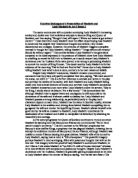Lady Macbeth accuses Macbeth of being a coward. She uses accusatory language ordering to know which of the lords have done this to Macbeth “which of you have done this?” she also uses broken syntax which indicates she is under pressure. She goes on to give Macbeth a lecture using the phrase “o’ proper stuff this is the very painting of your fear” signifying lady Macbeth doesn’t believe Macbeth, she thinks its his imagination, for the reason that, that is precisely what he is scared of, so she believes he is so worried, he thinks he sees the spirit. Lady Macbeth related Macbeth saying “ay and a bold one, that dare look on that which might appal the devil” with the dagger Macbeth claimed he saw, just before he murdered Duncan. Lady Macbeth uses a hyperbole by exaggerating Macbeth’s behaviour comparing it to an old woman’s fairy-tale “a woman’s story by the winter fire” this shows she does not have faith in him in the slightest. Line 62 lady Macbeth uses a metaphor “this is the very painting of your fear” meaning this she is implying this is his imagination; she thinks he is imagining the worst.
Lady Macbeth does not succeed in calming Macbeth down as he still shouts at the ghost “why what I care? I thou canst nod, speak too” this quote indicates that he wants the ghost to speak and explain why he is there. In the paragraph where Lady Macbeth criticises Macbeth for being weak, Macbeth uses a lot of exclamation in his speech when he is speaking to and about the ghost, this reveals he is terrified and confused, he also stops and starts his speech using broken syntax, this is more evidence he is scared. Macbeth uses a lexical set focusing on death, from line 71 “if charnel-houses (which is the vaults for the storage of the bones of the dead) and our graves (where dead people are buried) must send those that we bury back, our monuments (a statue in memory of someone or something)” this is verification that he is terrified of the death of Banquo.
A pattern of Macbeth and lady Macbeth occurs, Macbeth reveals his fears when the ghost appears, lady Macbeth attempts to get Macbeth into an imperturbable mood but she fails to accomplish her objective as Macbeth cant control his conscience and his fear takes over him. Macbeth the publicity betrays his fear to the lords that are in his presence. Macbeth uses animal imagery “approach that like the Russian bear, the arm’d rhinoceros, or th’hyrcan tiger” Macbeth is saying if he had to fight a tiger, rhinoceros or a bear, but the fact he thinks he is going to get found out, is claiming to much for him. Macbeth demands the ghost to leave using definitive language “hence horrible shadow, unreal mock’ry hence” showing Macbeth’s getting stronger, telling himself it is not real, the ghost of Banquo leaves when this is said. There is also a lot of broken syntax here, when Macbeth gives the speech about the animals, he is anxious he is going to get perceived about plotting the deaths.
Lady Macbeth and Macbeth use definitive language, for example lady Macbeth orders the lord to leave whilst Macbeth orders the ghost to disappear. Lady Macbeth tries to pull Macbeth together throughout the scene but fails, as the banquet progresses Macbeth becomes worst his state of mind. The both use broken syntax when they are in lousy situations, like when lady Macbeth uses it in her speech, it shows anger and frustration towards Macbeth. Macbeth uses broken syntax when he learns Fleance is still living this shows anger, worry and desperation. The two are juxtaposed as lady Macbeth gains control Macbeth is franticly losing it, this evidence is proofed when the ghost of Banquo is in the banquet and only Macbeth can see it and he gets frustrated when everyone claims they cannot see it as he thinks he is going mad.
Lady Macbeth knows Macbeth is not going to serene and panics as the lords are there and is exceedingly concerned about her image, she permits them to leave as a product of them not thinking her and Macbeth are insane.







